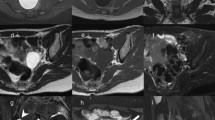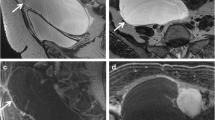Abstract
In reproductive women, various physiologic conditions can cause morphologic changes of the ovary, resembling pathologic conditions. Benign ovarian diseases can also simulate malignancies. Magnetic resonance imaging (MRI) can play an important role in establishing accurate diagnosis. Functional cysts should not be confused with cystic neoplasms. Corpus luteum cysts typically have a thick wall and are occasionally hemorrhagic. Multicystic lesions that may mimic cystic neoplasms include hyperreactio luteinalis, ovarian hyperstimulation syndrome, and polycystic ovary syndrome. Recognition of clinical settings can help establish diagnosis. In endometrial cysts, MRI usually provides specific diagnosis; however, decidual change during pregnancy should not be confused with secondary neoplasm. Peritoneal inclusion cysts can be distinguished from cystic neoplasms by recognition of their characteristic configurations. Ovarian torsion and massive ovarian edema may mimic solid malignant tumors. Recognition of normal follicles and anatomic structures is useful in diagnosing these conditions. In pelvic inflammatory diseases, transfascial spread of the lesion should not be confused with invasive malignant tumors. Radiologic identification of abscess formation can be a diagnostic clue. Many benign tumors, including teratoma, Brenner tumor, and sex-cord stromal tumor, frequently show characteristic MRI features. Knowledge of MRI features of these conditions is essential in establishing accurate diagnosis and determining appropriate treatment.




















Similar content being viewed by others
References
Pretorius ES, Outwater EK, Hunt JL, Siegelman ES (2001) Magnetic resonance imaging of the ovary. Top Magn Reson Imaging 12:131–46
Togashi K (2003) MR imaging of the ovaries: normal appearance and benign disease. Radiol Clin North Am 41:799–811
Fleischer AC, Daniell JF, Rodier J, Lindsay AM, James AE Jr (1981) Sonographic monitoring of ovarian follicular development. J Clin Ultrasound 9:275–280
Outwater EK, Talerman A, Dunton C (1996) Normal adnexa uteri specimens: anatomic basis of MR imaging features. Radiology 201:751–755
Outwater EK, Mitchell DG (1996) Normal ovaries and functional cysts: MR appearance. Radiology 198:397–402
Rosai J (1996) Female reproductive system. Ackerman’s surgical pathology 8th edn. St. Louis
Balen A, Michelmore K (2002) What is polycystic ovary syndrome? Are national views important? Hum Reprod 17:2219–2227
Kimura I, Togashi K, Kawakami S, Nakano Y, Takakura K, Mori T, Konishi J (1996) Polycystic ovaries: implications of diagnosis with MR imaging. Radiology 201:549–552
Tanaka YO, Tsunoda H, Kitagawa Y, Ueno T, Yoshikawa H, Saida Y (2004) Functioning ovarian tumors: direct and indirect findings at MR imaging. Radiographics 24(Suppl 1):S147–S166
Ghossain MA, Buy JN, Ruiz A, Jacob D, Sciot C, Hugol D, Vadrot D (1998) Hyperreactio luteinalis in a normal pregnancy: sonographic and MRI findings. J Magn Reson Imaging 8:1203–1206
Togashi K, Nishimura K, Kimura I, Tsuda Y, Yamashita K, Shibata T, Nakano Y, Konishi J, Konishi I, Mori T (1991) Endometrial cysts: diagnosis with MR imaging. Radiology 180:73–78
Gougoutas CA, Siegelman ES, Hunt J, Outwater EK (2000) Pelvic endometriosis: various manifestations and MR imaging findings. AJR Am J Roentgenol 175:353–358
Outwater E, Schiebler ML, Owen RS, Schnall MD (1993) Characterization of hemorrhagic adnexal lesions with MR imaging: blinded reader study. Radiology 186:489–494
Tanaka YO, Yoshizako T, Nishida M, Yamaguchi M, Sugimura K, Itai Y (2000) Ovarian carcinoma in patients with endometriosis: MR imaging findings. AJR Am J Roentgenol 175:1423–30
Tanaka YO, Shigemitsu S, Nagata M, Shindo M, Okamoto Y, Yoshikawa H, Itai Y (2002) A decidualized endometrial cyst in a pregnant woman: a case observed with a steady-state free precession imaging sequence. Magn Reson Imaging 20:301–304
Jain KA (2000) Imaging of peritoneal inclusion cysts. AJR Am J Roentgenol 174:1559–1563
Rha SE, Byun JY, Jung SE, Jung JI, Choi BG, Kim BS, Kim H, Lee JM (2002) CT and MR imaging features of adnexal torsion. Radiographics 22:283–294
Ghossain MA, Hachem K, Buy JN, Hourany-Rizk RG, Aoun NJ, Haddad-Zebouni S, Mansour F, Attieh E, Abboud J (2004) Adnexal torsion: magnetic resonance findings in the viable adnexa with emphasis on stromal ovarian appearance. J Magn Reson Imaging 20:451–462
Haque TL, Togashi K, Kobayashi H, Fujii S, Konishi J (2000) Adnexal torsion: MR imaging findings of viable ovary. Eur Radiol 10:1954–1957
Minutoli F, Blandino A, Gaeta M, Lentini M, Pandolfo I (2001) Twisted ovarian fibroma with high signal intensity on T1-weighted MR image: a new sign of torsion of ovarian tumors? Eur Radiol 11:1151–1154
Hall BP, Printz DA, Roth J (1993) Massive ovarian edema: ultrasound and MR characteristics. J Comput Assist Tomogr 17:477–479
Bazot M, Detchev R, Cortez A, Uzan S, Darai E (2003) Massive ovarian edema revealing gastric carcinoma: a case report. Gynecol Oncol 91:648–650
Kao HW, Wu CJ, Chung KT, Wang SR, Chen CY (2005) MR imaging of pregnancy luteoma: a case report and correlation with the clinical features. Korean J Radiol 6:44–46
Tukeva TA, Aronen HJ, Karjalainen PT, Molander P, Paavonen T, Paavonen J (1999) MR imaging in pelvic inflammatory disease: comparison with laparoscopy and US. Radiology 210:209–216
Kim SH, Yang DM, Kim KA (2004) Unusual causes of tubo-ovarian abscess: CT and MR imaging findings. Radiographics 24:1575–1589
Hawnaur JM, Reynolds K, McGettigan C (1999) Magnetic resonance imaging of actinomycosis presenting as pelvic malignancy. Br J Radiol 72:1006–1011
Outwater EK, Siegelman ES, Hunt JL (2001) Ovarian teratomas: tumor types and imaging characteristics. Radiographics 21:475–490
Pereira JM, Sirlin CB, Pinto PS, Casola G (2005) CT and MR imaging of extrahepatic fatty masses of the abdomen and pelvis: techniques, diagnosis, differential diagnosis, and pitfalls. Radiographics 25:69–85
Yamashita Y, Hatanaka Y, Torashima M, Takahashi M, Miyazaki K, Okamura H (1994) Mature cystic teratomas of the ovary without fat in the cystic cavity: MR features in 12 cases. AJR Am J Roentgenol 163:613–616
Kido A, Togashi K, Konishi I, Kataoka ML, Koyama T, Ueda H, Fujii S, Konishi J (1999) Dermoid cysts of the ovary with malignant transformation: MR appearance. AJR Am J Roentgenol 172:445–449
Cho SM, Byun JY, Rha SE, Jung SE, Park GS, Kim BK, Kim B, Cho KS, Jung NY, Kim SH, Lee JM (2004) CT and MRI findings of cystadenofibromas of the ovary. Eur Radiol 14:798–804
Balasa RW, Adcock LL, Prem KA, Dehner LP (1977) The Brenner tumor: a clinicopathologic review. Obstet Gynecol 50:120–128
Outwater EK, Siegelman ES, Kim B, Chiowanich P, Blasbalg R, Kilger A (1998) Ovarian Brenner tumors: MR imaging characteristics. Magn Reson Imaging 16:1147–1153
Moon WJ, Koh BH, Kim SK, Kim YS, Rhim HC, Cho OK, Hahm CK, Byun JY, Cho KS, Kim SH (2000) Brenner tumor of the ovary: CT and MR findings. J Comput Assist Tomogr 24:72–76
Young RH, Scully RE (1994) Sex-cord stromal tumor, steroid cell, and other ovarian tumors with endocrine, paraendocrine, and paraneoplastic manifestations. Blaustein’s pathology of the female genital tract 4th edn. New York
Bierman SM, Reuter KL, Hunter RE (1990) Meigs syndrome and ovarian fibroma: CT findings. J Comput Assist Tomogr 14:833–834
Nemeth AJ, Patel SK (2003) Meigs syndrome revisited. J Thorac Imaging 18:100–103
Seracchioli R, Bagnoli A, Colombo FM, Missiroli S, Venturoli S (2001) Conservative treatment of recurrent ovarian fibromas in a young patient affected by Gorlin syndrome. Hum Reprod 16:1261–1263
Bazot M, Salem C, Cortez A, Antoine JM, Darai E (2003) Imaging of ovarian fibromatosis. AJR Am J Roentgenol 180:1288–1290
Young RH, Scully RE (1984) Fibromatosis and massive edema of the ovary, possibly related entities: a report of 14 cases of fibromatosis and 11 cases of massive edema. Int J Gynecol Pathol 3:153–178
Onderoglu LS, Gultekin M, Dursun P, Karcaaltincaba M, Usubutun A, Akata D, Ayhan A (2004) Bilateral ovarian fibromatosis presenting with ascites and hirsutism. Gynecol Oncol 94:223–225
Ihara N, Togashi K, Todo G, Nakai A, Kojima N, Ishigaki T, Suginami N, Kinoshita M, Shintaku M (1999) Sclerosing stromal tumor of the ovary: MRI. J Comput Assist Tomogr 23:555–557
Joja I, Okuno K, Tsunoda M, Takeda Y, Sugita K, Mizutani Y, Miyagi Y, Kudo T, Notohara K, Hiraki Y (2001) Sclerosing stromal tumor of the ovary: US, MR, and dynamic MR findings. J Comput Assist Tomogr 25:201–206
Matsubayashi R, Matsuo Y, Doi J, Kudo S, Matsuguchi K, Sugimori H (1999) Sclerosing stromal tumor of the ovary: radiologic findings. Eur Radiol 9:1335–1338
Author information
Authors and Affiliations
Corresponding author
Rights and permissions
About this article
Cite this article
Tamai, K., Koyama, T., Saga, T. et al. MR features of physiologic and benign conditions of the ovary. Eur Radiol 16, 2700–2711 (2006). https://doi.org/10.1007/s00330-006-0302-6
Received:
Revised:
Accepted:
Published:
Issue Date:
DOI: https://doi.org/10.1007/s00330-006-0302-6




